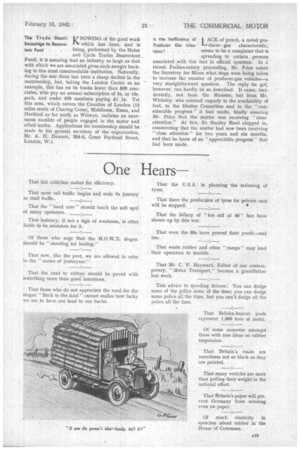One Hears—
Page 21

If you've noticed an error in this article please click here to report it so we can fix it.
That fair criticism makes for efficiency.
That most rail traffic begins and ends its journey as road traffic. 0 • That the "hard core" should touch the soft spot of many operators.
That leniency, if not a sign of weakness, is often liable to be mistaken for it.
Of those who urge that the M.O.W.T,. slogan should be "shooting for looting."
That now, like the poet, we are allowed to refer to the " snows of kesteryear."
That the road to victory should be paved with something more than good intentions.
That those who do not appreciate the need for the slogan ." Back to the land" cannot realize how lucky we are to have our land to our backs. That the U.S.A. is planning the rationing of tyres.
That there the production of tyres for private cars will be stopped. • That the fallacy of "too old at 40" has been shown up by this war, That even the 60s have proved their youth—and nse.
That waste rubber and other "ramps" may lead • their operators to trouble.
That Mr. C. F. Hayward, Editor of our contemporary, "Motor. Transport," became a grandfather last week.
This advice to speeding drivers: You can dodge some of the police some of the time; you can dodge some police all the time, but you can't dodge all the police all the time.
That Belisha-beacon posts represent 1,000 tons of metal.
Of some suspense amongst. those with new ideas on rubber suspension.
That Britain's roads are sometimes not so-black as they are painted.
That many vehicles are more than pulling their weight in the national effort.
That 8ritain's paper will prevent Germany from winning even on paper.
"Of much elasticity in speeches about rubber in the House of Commons.




















































